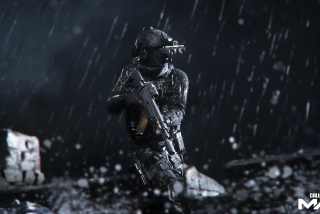Multiple Roles Played in Title’s Creation
- Share via
Job titles mean little during the game development process. Often, every member of a team pitches in on every aspect of the game’s design. And few teams have more experience than the designers and artists at Volition, creator of the award-winning “Descent” series. Most recently, the veteran PC studio has wrapped up “Summoner” for Sony PlayStation2. It’s the company’s first console title, a role-playing game that aims to bring medieval mumbo jumbo to the masses. Lead programmer Mark Allender describes the process.
Q: How did you create an entire world?
A: It’s a complicated process. First a writer creates a back story for the main characters. Then artists create concept art and flesh out in-game environments as they appear in their minds. Afterward, all the design leads decide if it fits with their vision of the product, at which point the artists really go to town and the creative team begins to let their imagination run wild. And it helped to have 23 people involved on the project.
Q: Should next-generation role-playing games look to their roots for inspiration?
A: There are great benefits to looking back on traditional gaming products and adopting the best elements derived thereof. But the RPG genre has been around a long time and there are also benefits to looking beyond the walls we’ve been confined to and breaking out of the mold. The most obvious change would be full 3-D perspectives, which seemingly give players a much more realistic sense of the world around them. People are just beginning to find out how powerful a tool the third dimension can be in this context.
Q: What’s involved in getting into the frame of mind to develop a fantasy adventure?
A: It’s really just a matter of looking at the best aspects of popular games and finding out how to mimic those and make them better. We were considering starting up a few 20-hour Dungeons & Dragons marathons too, but who’s got the time these days?
Q: Is a lifelong background in tabletop gaming mandatory for an RPG designer?
A: Absolutely not. What’s more mandatory is a love of the genre. You can do game development all your life and still not be very good at it. People who have a real passion for certain titles are the most well equipped to handle creative duties. Understanding doesn’t have to be the result of years spent role playing, it can come from having played all the RPGs of the last 5 years and realizing what it is they did right. It all depends on your devotion to the topic.
Q: What advantages can experienced PC teams leverage into console development?
A: Having had to deal with a trillion hardware configurations. When you’re focusing on a lone console setup, you can bring your collective knowledge to bear against any problems that might arise.
Q: How do you maintain your vision throughout a multiyear development cycle?
A: Teamwork. This sort of undertaking can be a very mentally taxing process. At some point, every member of every team begins to lose their focus. That’s the good part about having many people involved in projects nowadays. When someone begins to lose focus, somebody else is there to point them back in the right direction.
Q: Can a lone feature make or break a good adventure?
A: Story could. You can deliver a great-looking RPG, but if the plot doesn’t get players properly involved or draw them into the lives of the characters, the game’s easy to forget. It’s the tale being told that defines the quality of an adventure.
Q: Do you consider it appropriate to wear a broadsword to work?
A: Nope. You’d either get arrested or scare your co-workers away.
*
Scott Steinberg is a freelance writer specializing in video games.
More to Read
The biggest entertainment stories
Get our big stories about Hollywood, film, television, music, arts, culture and more right in your inbox as soon as they publish.
You may occasionally receive promotional content from the Los Angeles Times.










